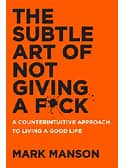Book Summary - The subtle art of not giving a f*ck
The subtle art of not giving a f*ck (Summary)
Chapter-1 :
-Self improvement and success often occur together. But that doesn't necessarily mean they are the same thing.
-All the positive and happy self-help stuff we hear all the time - is actually fixating on what you lack.-The backward law - Wanting positive experience is a negative experience ; accepting negative experience is a positive experience.
-Subtlety 1:Not giving a f*ck doesn't mean being Indifferent ; it means being comfortable with being different.
-Subtlety 2:To not give a f*ck about adversity you must first give a f*ck about something more important than adversity.
-Subtlety 3:Whether you realize it or not, you are always choosing what to give a f*ck about.
Chapter-2:
-Whatever your problems are, the concept is the same: solve problems ;be happy. Unfortunately many people f*ck things up in at least one of the two ways:1)Denial:- They deny reality
2)Victim mentality:- Blame others and
outside circumstances.
-Emotions are feedback mechanisms telling us that something is either likely right or likely wrong for us - nothing more, nothing less.
-What determines your success isn't, "What do you want to enjoy?" The relevant question is, "What pain do you want to sustain?"
Chapter-3:
-The deeper the pain, the more helpless we feel against our problems, and the more entitlement we adopt to compensate for those problems in one of the two ways:1)I'm awesome and rest of you all suck,
so I deserve special treatment.
2)I suck and rest of you all are awesome,
so I deserve special treatment.
-Most of us are pretty average at most things we do. Even if you are exceptional in one thing, chances are you are average or below average at most other things. That's just the nature of life. To be exceptional you have to dedicate shit-tons of time and energy but you have limited time and energy.
Chapter-4:
-Value and metric we set determines our happiness.
-"Self-improvement" is really about : prioritizing better values. Because when you give better f*cks, you get better problems. And when you get better problems, you get a better life.
Chapter-5:
-We don't always control what happens to us. But we always control how we interpret what happens to us, as well as how we respond.
Chapter-6:
-Being wrong opens Boss up to the possibility of change. Being wrong brings the opportunity for growth
- Question your own intentions and motivations.
- The man who believes he knows everything learns nothing.
- Parkinson's law: "Work expands so as to fill up the time available for its completion"
- Murphy's law: "Whatever can go wrong will go wrong"
- Manson's law of avoidance: "The more something threatens your identity, the more you will avoid it"
- If you are sitting there, miserable day after day, then that means you are already wrong about something major in your life, and until you are able to you question yourself to find it, nothing will change.
Chapter-7:
-Avoiding failure is something we learn at some later point of life. A lot of it comes from our education system. Another large share of it comes from overbearing or critical parents who don't let their kids screw up their own often enough, and instead punish them for trying anything new and not preordained. And then there we have all the mass media that constantly expose us to stellar success after success. While not showing us the thousands of hours of dull practice and tedium that were required to achieve that success.
-If you are stuck on a problem, don't sit there and think about it ; just start working on it. Even if you don't know what you are doing, the simple act of working on it will eventually cause the right ideas to show up in your head.
Inspiration ➡ Motivation ➡ Action ➡ Inspiration ➡ Motivation ➡ Action ➡ Etc
Chapter-8:
-Travel is a fantastic self development tool, because it extricates you from the value of your own culture and shows you that another society can live with entirely different values and still functions and not hate themselves. This exposure to different cultural values and metrics then forces you to re-examines what seems obvious in your own life and to consider that perhaps it's not necessarily the best way to live.
-Honesty is a natural human craving. But part of having honesty in our lives is becoming comfortable with saying and hearing the word "no".
-People can't solve your problem for you, and they shouldn't try, because that won't make you happy. You can't solve other people's problem for them either, because that likewise won't make them happy.
Chapter-9:
-Death scares us. And because it scares us, we avoid thinking about it, talking about it, sometime even acknowledging it, even if it's happening to someone close to us. Yet, in a bizarre, backward way, death is the light by which the shadow of all of life's meaning is measured. Without death, everything would feel inconsequential, all experience arbitrary, all metrics and values suddenly zero.
Author:Mark Manson




Comments
Post a Comment